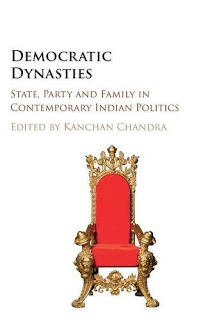Democratic Dynasties: State, Party, and Family in Contemporary Indian Politics.
edited by Kanchan Chandra, Cambridge University Press, New Delhi, 2016. ISBN: 9781107123441.
About the Book
Dynastic politics, usually presumed to be the antithesis of democracy, is a routine aspect of politics in many modern democracies. This book introduces a new theoretical perspective on dynasticism in democracies, using original data on twenty-first-century Indian parliaments. It argues that the roots of dynastic politics lie at least in part in modern democratic institutions - states and parties - which give political families a leg-up in the electoral process. It also proposes a rethinking of the view that dynastic politics is a violation of democracy, showing that it can also reinforce some aspects of democracy while violating others. Finally, this book suggests that both reinforcement and violation are the products, not of some property intrinsic to political dynasties, but of the institutional environment from which those dynasties emerge. The first book-length study of dynastic politics in modern democracies. Offers a new perspective on how dynasties develop and why they matter. Uses original data from twenty-first-century Indian parliaments to introduce a new theoretical perspective on dynasticism in democracies.
Table of Contents
Prologue | Kanchan Chandra
1. Democratic dynasties: state, party and family in contemporary Indian politics | Kanchan Chandra
2. The 'old regime' confronts democracy Lloyd I. Rudolph and Susanne H. Rudolph
3. A sign of backwardness? Where dynastic leaders are elected in India | Francesca Jensenius
4. Dynasticism across Indian political parties | Adam Ziegfeld
5. Women, dynasties and democracy in India | Amrita Basu
6. Reservations and dynastic politics | Simon Chauchard
7. Why forward castes have a dynastic advantage: dynasty, party and co-ethnic favouritism | Kanchan Chandra
8. Dynastic path to power | Anjali Thomas Bohlken
edited by Kanchan Chandra, Cambridge University Press, New Delhi, 2016. ISBN: 9781107123441.
About the Book
Dynastic politics, usually presumed to be the antithesis of democracy, is a routine aspect of politics in many modern democracies. This book introduces a new theoretical perspective on dynasticism in democracies, using original data on twenty-first-century Indian parliaments. It argues that the roots of dynastic politics lie at least in part in modern democratic institutions - states and parties - which give political families a leg-up in the electoral process. It also proposes a rethinking of the view that dynastic politics is a violation of democracy, showing that it can also reinforce some aspects of democracy while violating others. Finally, this book suggests that both reinforcement and violation are the products, not of some property intrinsic to political dynasties, but of the institutional environment from which those dynasties emerge. The first book-length study of dynastic politics in modern democracies. Offers a new perspective on how dynasties develop and why they matter. Uses original data from twenty-first-century Indian parliaments to introduce a new theoretical perspective on dynasticism in democracies.
Table of Contents
Prologue | Kanchan Chandra
1. Democratic dynasties: state, party and family in contemporary Indian politics | Kanchan Chandra
2. The 'old regime' confronts democracy Lloyd I. Rudolph and Susanne H. Rudolph
3. A sign of backwardness? Where dynastic leaders are elected in India | Francesca Jensenius
4. Dynasticism across Indian political parties | Adam Ziegfeld
5. Women, dynasties and democracy in India | Amrita Basu
6. Reservations and dynastic politics | Simon Chauchard
7. Why forward castes have a dynastic advantage: dynasty, party and co-ethnic favouritism | Kanchan Chandra
8. Dynastic path to power | Anjali Thomas Bohlken

No comments:
Post a Comment